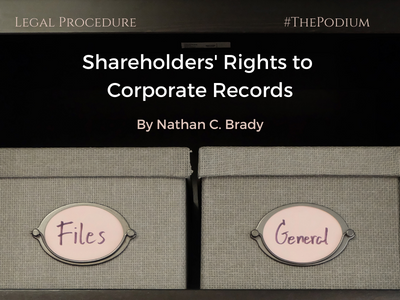
By Nathan C. Brady
Bio: Mr. Brady is an associate attorney in the corporate law department at Berliner Cohen, LLP. He can be reached by phone at (209) 576-0111 and via email at nathan.brady@berliner.com.
The California Corporations Code (hereinafter, “Corporations Code”) affords rights and protections to shareholders of a corporation. One of the major protections afforded to shareholders is their right to corporate records. This article briefly addresses what records a corporation must keep and provide to its shareholders, limitations on how or when the records must be provided and remedies a shareholder may take should the corporation refuse a lawful demand.
What records is a corporation required to keep or provide to its shareholders?
A corporation is required to keep at its principal executive office, or at its principal business office in this state if its principal executive office is not in this state, the original or a copy of its bylaws as amended to date. (Cal. Corp. Code § 213). A shareholder is entitled to review a corporation’s bylaws at all reasonable times during office hours, and if the principal executive office is outside this state and the corporation has no principal business office in this state, then the corporation shall furnish a copy of the bylaws as amended to date to the requesting shareholder upon their written request. Id.
Further, and unless properly waived, a corporation’s board shall cause an annual report to be sent to the shareholders not later than 120 days after the close of the fiscal year. (Cal. Corp. Code § 1501(a)(1)). The annual report shall contain a balance sheet as of the end of that fiscal year, an income statement, and a statement of cashflows for that fiscal year, accompanied by a report from an independent accountant or, if there is no report, a certificate from an authorized corporate officer that the statements were prepared without audit from the books and records of the corporation. Id. If a corporation fails to send an annual report for the last fiscal year, upon the written request of any shareholder made more than 120 days after the close of that fiscal year, the corporation shall deliver or mail to the requesting shareholder the financial statements as required by Corporations Code section 1501(a)(1). (Cal. Corp. Code § 1501(c)). Subject to certain time restrictions, a shareholder holding at least 5% of the outstanding shares of any class is also entitled to quarterly financial information upon submitting a written request for such. Id.
The record of shareholders shall also be open to inspection and copying by any shareholder at any time during usual business hours upon written demand on the corporation. (Cal. Corp. Code §1600(c)). It is important to highlight that this request must be for a purpose reasonably related to such holder’s interests as a shareholder. Id. Any inspection and copying done pursuant to Corporations Code section 1600 may be made in person, by agent, or by attorney, and may not be limited by the articles or bylaws. (Cal. Corp. Code §1600(d)).
Lastly, any shareholder is entitled to receive, upon their written demand, the accounting books, records, and minutes of proceedings of the shareholders and the board and committees of the board of any domestic corporation, and any foreign corporation which keeps any records in this state or has its principal executive office in this state, so long as the purpose for the demand is reasonably related to the holder’s interests as a shareholder. (Cal. Corp. Code §1601(a)(1)). Like Corporations Code section 1600(d), any inspection and copying done pursuant to Corporations Code section 1601 may be made in person, by agent, or by attorney, and may not be limited by the articles or bylaws. (Cal. Corp. Code §1601(b)).
How does a shareholder enforce their right to inspect a corporation’s records?
Should a corporation refuse to comply with a shareholder’s lawful demand for inspection, a shareholder may enforce their right to do so by having the superior court of the proper county appoint one or more competent inspectors or accountants to audit the books and records of the corporation as the court may direct. (Cal. Corp. Code §1603(a)). All officers and agents of the corporation shall then produce to the inspectors or accounts so appointed all books and documents in their custody or power, under penalty of punishment for contempt of court. (Cal. Corp. Code §1603(b)). It should be noted that all expenses of the investigation or audit shall be paid by the inspecting shareholder unless the court orders them to be paid or shared by the corporation. (Cal. Corp. Code §1603(c)).
A corporation may also be subject to penalties for failing to keep or provide certain corporate documents to qualifying shareholders under Corporations Code section 2200, and under limited circumstances, a shareholder may be entitled to recover reasonable expenses and attorney’s fees.
The Attorney General may also file a complaint against a foreign or domestic corporation that fails to comply with certain statutory requirements. (Cal. Corp. Code § 1508). Relief may be granted by way of injunction, dissolution, the appointment of receivers, or any other temporary, preliminary, provisional, or final remedies as necessary to protect the rights of the shareholders or to undo the consequences of a corporation’s failure to comply with such requirements. Id.
Conclusion
The Corporations Code provides rights and limitations to a shareholder’s right to receive and review corporate records. This article does not identify all of the rights and limitations prescribed by law, does not constitute legal advice, and does not create any attorney/client relationship. It is recommended you speak with an attorney directly to evaluate the best course of action when requesting or responding to a request for corporate records.
Categorized in: Legal Procedure
| << previous | next >> |








